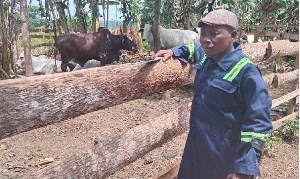Days after the former Trade and Industry Minister- Daniel Kwesi Abodakpi was convicted for willfully causing financial loss to the state, I still continue to lose some sleep over his sentence.
In addition to the worry, I have to grapple with just a mere coincidence as it relates to the judge who sentenced him- Justice Stephen Farkye, and the man- Daniel Abodakpi as I knew him some years ago.
Why this? Farkye’s daughter and son were both a class and school mates, and I could recall, that their father was a highly respected judge who during the mid-1980s dispensed justice without fear or favor during those indiscipline days in Western Ghana’s mining town of Tarkwa.
The connection to, and respect for Abodakpi also emanates from the former minister’s admiring persona, and his massive contribution to the transformation of Tarkoradi Secondary School (Tadisco), for which the people of the twin-city of Sekondi-Takoradi would forever be grateful.
As someone born and raised in "Tadi", not only did I witness how Daniel Abodakpi used his positive influence during the (P) NDC era to change the status of "Tadisco" from just one of the schools around, to a center of higher academic excellence in the Western part of Ghana.
In a country where people are deeply committed to helping communities based on ethnicity, Abodakpi, a native of the Volta region of Ghana, defied ethnic leanings, and responded to the call to develop a school in another part of the country. I am deeply saddened by his sentence.
On the flip side, Justice Stephen T. Farkye as I knew him in Tarkwa, was a highly respected lawyer who (with all due respect to those criticizing him) cannot be manipulated to alter judgement on any individual’s guilt.
In Tarkwa, Farkye was very strict in the court room, a man who carved a good name for himself in the Wassa-West district.
It is for these reasons - Abodakpi’s connection to humanity and academic development, and Farkye’s fair and unblemished record in the administration of justice, that I write, appealing to Ghanaians, especially members of the opposition National Democratic Congress (NDC), to be circumspect in their protest, threat against the judiciary, and more so the government of Ghana.
Legislators who have also boycotted parliamentary proceedings because of the jailed former minister, should go back to the House and explore appeal options, including the supreme court.
If convinced that Abodapki needs redress, they need to explain to the people why their colleague’s sentence is part of the government’s agenda for selective justice.
It needs to be mentioned though, that there are some supporters and sympathizers of the ruling government who have nicely escaped the discomfort of facing the music for acts of corruption, misappropriation of the tax payer’s money, thus "willfully causing financial loss to the state".
The people do not have to provide proof due to the fact that state agencies are well positioned to investigate corrupt public officials.
Honestly, it took the Commission on Human Rights and Administrative Justice to recommend the sacking of Dr. Richard Anane, former Roads and Transportation minister.
Anane had to "safely" resign, having been subdued by the desire for love in a "condom-conscious" part of the world, and extending huge financial help to a mistress.
These notwithstanding, it is an insult to the judiciary, how a political party would suggest that the present government of Ghana influenced, or prescribed how Daniel Abodakpi should be sentenced.
Abodakpi is admired for what he stood for during the (P) NDC era, his contribution to trade and investment, and the workings of the Ghana parliament.
Indeed, he is a "nice" gentleman who does not use foul language, and played a singular, but active role in helping the media gather information for public educational.
Abodakpi respects people irrespective of their religion, political, or ethnic background, and I share with his family, the pain they have to endure for their loved one.
But for the Trade and Investment Program (TIP) which he co-chaired with the late Victor Selormey, then the deputy minister of finance, he did willfully cause financial loss to the state, according to Justice Farkye, and based on the evidence gathered by the prosecutor.
On the strength of this judgement, if as a people, we believe, that judges are human and can err, but have discretionary powers that can be used in cases under their jurisdiction, we can only assert, that may be, Abodapki’s defense was not strong enough to merit a lesser sentence, or be freed.
If as a nation, we want to set a legal precedent by tempering justice with mercy, we have to hastily endorse that devoid of name calling , threats, and boycotts, as we prepare ourselves to regain rights already exchanged with institutions of state to facilitate good governance, protection, and the rule of law.
We can, if we so desire, through popular acclamation, rewrite the "social contract", and by that unnecessary change of a system create a lawless country for ourselves, a country with no respect for the law.
Our unyielding quest to change the course of history by brandishing the judiciary as an extension of the executive, rather than an independent arm of government should be diffused through rational thinking and unsaturated respect for the law.
If we still believe, that the judiciary is, and would remain an important component of democratic governance , then we should either respect the rulings of the courts, or challenge them through the due process of the law.
Until we realize that as a nation, we must manage our emotions well over these matters and avoid causing injury to the hard won reputation of some of our friends in the judiciary, peace would elude us.
For now, we have to debunk the perception, that the government handed down Abodakpi’s sentence through Justice Farkye.
Failure to do so, in my estimation, would be unfair to the government, the judiciary, and unbiased watchers our political scene who still believe Ghana is a democratic state where the rule of law works.















